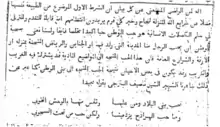Hadiqat Al Akhbar
Hadiqat Al Akhbar (Arabic: حديقة الاخبار; The News Garden) was an Arabic newspaper which was published in Beirut in the period 1858–1911 with a two-year interruption. Its subtitle was Ṣaḥīfat Sūriyah wa-Lubnān (Newspaper of Syria and Lebanon in Arabic).[1] The paper was the first private daily in Beirut[2] and the first Arabic newspaper which had a regular literary section.[3]
 Issue 173 of the paper dated August 1861 | |
| Owner(s) | Khalil Al Khuri |
|---|---|
| Founder(s) | Khalil Al Khuri |
| Publisher | Al Matbaa Al Suriyya |
| Editor-in-chief | Khalil Al Khuri |
| Founded | 29 June 1858 |
| Language | Arabic French |
| Ceased publication | 10 April 1911 |
| Headquarters | Beirut |
| Country | Lebanon |
| OCLC number | 213490831 |
History and profile
Hadiqat Al Akhbar was launched by Khalil Al Khuri, a Syrian, in Beirut as an Arabic publication.[4] The financier of the paper of which the first issue appeared on 29 June 1858[5] was Michel Médawar.[4] He was a Greek Catholic merchant working at the French Consulate in Beirut as an interpreter.[4] Its publisher was Al Matbaa Al Suriyya which was owned by Al Khuri.[6] He also edited the paper which began to be published both in Arabic and French from 1870.[5] The French edition was entitled Hadiqat Al Akhbar. Journal de Syrie et Liban.[3]
The other contributors and Al Khuri were members of the Médawar Literary Circle.[4] Selim Nauphal was the editor who translated and serialized the French novels in the paper.[4] Antonius Ameuney was the contributor of the paper based in London.[4]
During its lifetime the frequency of Hadiqat Al Akhbar was changed from daily to weekly and then to biweekly.[7] It featured local and international news, reports on mercantile activity and also literary works.[4] Soon after its start the paper became one of the leading publications in Beirut.[6] However, from its start Hadiqat Al Akhbar was also distributed to other cities, including Damascus, Aleppo, Baghdad, Alexandria, Cairo, Istanbul, Paris, London and Leipzig.[4] The number of subscribers was nearly 400 within the three months after its start.[4] It gradually increased over time.[4]
In 1907 Hadiqat Al Akhbar temporarily ceased publication.[5] Its publication was restarted in April 1909, but the paper was permanently closed down on 10 April 1911.[5]
References
- "Ḥadīqat al-akhbār". WorldCat. Retrieved 5 February 2022.
- Marwan M. Kraidy (1999). "State Control of Television News in 1990s Lebanon". Annenberg School for Communication: 486. doi:10.1177/107769909907600306.
- Johann Strauss (2003). "Who Read What in the Ottoman Empire (19th-20th centuries)?". Middle Eastern Literatures. 6 (1): 43. doi:10.1080/14752620306881.
- Anthony Edwards (2020). "Serializing protestantism: the missionary Miscellany and the Arabic press in 1850s Beirut". British Journal of Middle Eastern Studies: 2, 14–18. doi:10.1080/13530194.2020.1765141.
- "Archive". Leibniz Zentrum Moderner Orient. Archived from the original on 10 November 2021. Retrieved 5 February 2022.
- Ami Ayalon (2008). "Private Publishing in the Nahda". International Journal of Middle East Studies. 40 (4): 561–577. doi:10.1017/S002074380808149X.
- Fruma Zachs; Sharon Halevi (November 2009). "From Difāʿ Al-Nisāʾ to Masʾalat Al-Nisāʾ in Greater Syria: Readers and Writers Debate Women and Their Rights, 1858-1900". International Journal of Middle East Studies. 41 (4): 617. doi:10.1017/S0020743809990390.
External links
 Media related to Hadiqat Al Akhbar at Wikimedia Commons
Media related to Hadiqat Al Akhbar at Wikimedia Commons